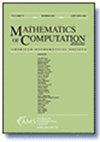负索博列夫范数或分数索博列夫范数的最小残差法
IF 2.2
2区 数学
Q1 MATHEMATICS, APPLIED
引用次数: 0
摘要
对于数值逼近,将偏微分方程重新表述为残差最小化问题的优点是所得到的线性系统是对称正定的,并且残差的范数提供了一个后验误差估计量。此外,它允许处理一般的非齐次边界条件。然而,在许多最小残差公式中,残差的一个或多个项以负或分数索博列夫范数测量。在这项工作中,我们提供了一种通用的方法,用有效的可求值表达式代替这些规范,而不牺牲所得到的数值解的拟最优性。我们通过验证具有非齐次Dirichlet和/或Neumann边界条件的模型二阶椭圆方程的四种表述的必要条件来举例说明我们的方法。本文报道了在超弱一阶系统公式中具有混合非齐次Dirichlet和Neumann边界条件的泊松问题的数值实验。本文章由计算机程序翻译,如有差异,请以英文原文为准。
Minimal residual methods in negative or fractional Sobolev norms
For numerical approximation the reformulation of a PDE as a residual minimisation problem has the advantages that the resulting linear system is symmetric positive definite, and that the norm of the residual provides an a posteriori error estimator. Furthermore, it allows for the treatment of general inhomogeneous boundary conditions. In many minimal residual formulations, however, one or more terms of the residual are measured in negative or fractional Sobolev norms. In this work, we provide a general approach to replace those norms by efficiently evaluable expressions without sacrificing quasi-optimality of the resulting numerical solution. We exemplify our approach by verifying the necessary inf-sup conditions for four formulations of a model second order elliptic equation with inhomogeneous Dirichlet and/or Neumann boundary conditions. We report on numerical experiments for the Poisson problem with mixed inhomogeneous Dirichlet and Neumann boundary conditions in an ultra-weak first order system formulation.
求助全文
通过发布文献求助,成功后即可免费获取论文全文。
去求助
来源期刊

Mathematics of Computation
数学-应用数学
CiteScore
3.90
自引率
5.00%
发文量
55
审稿时长
7.0 months
期刊介绍:
All articles submitted to this journal are peer-reviewed. The AMS has a single blind peer-review process in which the reviewers know who the authors of the manuscript are, but the authors do not have access to the information on who the peer reviewers are.
This journal is devoted to research articles of the highest quality in computational mathematics. Areas covered include numerical analysis, computational discrete mathematics, including number theory, algebra and combinatorics, and related fields such as stochastic numerical methods. Articles must be of significant computational interest and contain original and substantial mathematical analysis or development of computational methodology.
 求助内容:
求助内容: 应助结果提醒方式:
应助结果提醒方式:


